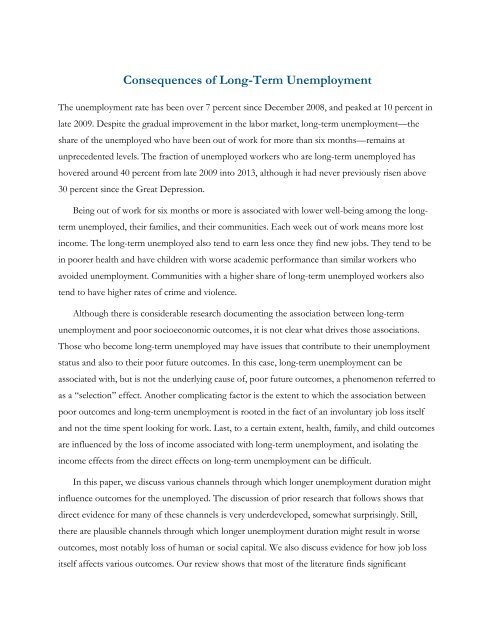Hidden Unemployment
Hidden Unemployment
Hidden Unemployment
You also want an ePaper? Increase the reach of your titles
YUMPU automatically turns print PDFs into web optimized ePapers that Google loves.
URBAN<br />
INSTITUTE<br />
Consequences of Long-Term <strong>Unemployment</strong><br />
The unemployment rate has been over 7 percent since December 2008, and peaked at 10 percent in<br />
late 2009. Despite the gradual improvement in the labor market, long-term unemployment—the<br />
share of the unemployed who have been out of work for more than six months—remains at<br />
unprecedented levels. The fraction of unemployed workers who are long-term unemployed has<br />
hovered around 40 percent from late 2009 into 2013, although it had never previously risen above<br />
30 percent since the Great Depression.<br />
Being out of work for six months or more is associated with lower well-being among the longterm<br />
unemployed, their families, and their communities. Each week out of work means more lost<br />
income. The long-term unemployed also tend to earn less once they find new jobs. They tend to be<br />
in poorer health and have children with worse academic performance than similar workers who<br />
avoided unemployment. Communities with a higher share of long-term unemployed workers also<br />
tend to have higher rates of crime and violence.<br />
Although there is considerable research documenting the association between long-term<br />
unemployment and poor socioeconomic outcomes, it is not clear what drives those associations.<br />
Those who become long-term unemployed may have issues that contribute to their unemployment<br />
status and also to their poor future outcomes. In this case, long-term unemployment can be<br />
associated with, but is not the underlying cause of, poor future outcomes, a phenomenon referred to<br />
as a “selection” effect. Another complicating factor is the extent to which the association between<br />
poor outcomes and long-term unemployment is rooted in the fact of an involuntary job loss itself<br />
and not the time spent looking for work. Last, to a certain extent, health, family, and child outcomes<br />
are influenced by the loss of income associated with long-term unemployment, and isolating the<br />
income effects from the direct effects on long-term unemployment can be difficult.<br />
In this paper, we discuss various channels through which longer unemployment duration might<br />
influence outcomes for the unemployed. The discussion of prior research that follows shows that<br />
direct evidence for many of these channels is very underdeveloped, somewhat surprisingly. Still,<br />
there are plausible channels through which longer unemployment duration might result in worse<br />
outcomes, most notably loss of human or social capital. We also discuss evidence for how job loss<br />
itself affects various outcomes. Our review shows that most of the literature finds significant

















